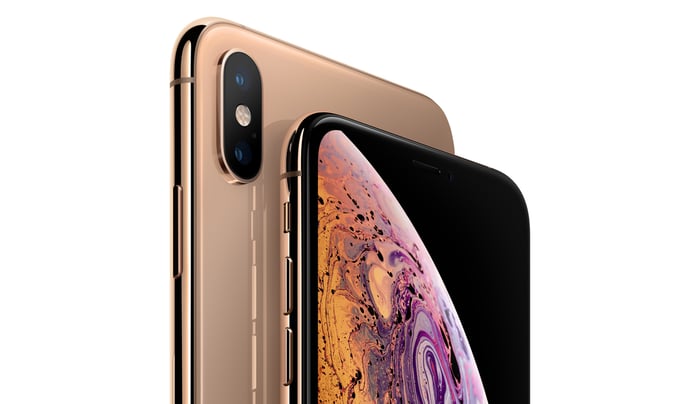Over the past year, there had been concerns that the iPhone X's $999 starting price tag was a bit steep, since many consumers cited that as a reason they weren't upgrading. Apple's (AAPL -0.70%) financial results didn't seem to suffer much, as CEO Tim Cook noted that iPhone X was the most popular model throughout the product cycle. That's probably why the company kept the iPhone XS at the $999 price and positioned the iPhone XS Max even higher at $1,099, which will likely boost average selling prices (ASPs) over the next year.
Longtime Apple analyst Gene Munster expects ASPs to hit $791 for fiscal 2019, for instance, modeling that XS Max units will comprise 12% of the unit mix. Pre-orders for the iPhone XS, iPhone XS Max, and Apple Watch Series 4 started today, and initial demand appears strong.

iPhone XS and iPhone XS Max. Image source: Apple.
Pre-order activity is booming
Shipping estimates for the iPhone XS Max are already slipping into October for many configurations, notably including the 512 GB storage configuration that costs a whopping $1,449. iPhone XS shipping estimates are also getting pushed back, including for that model's 512 GB configuration that costs $1,349. That means that Apple has already sold out of some of its launch inventory for its new flagship models.
It's worth noting that Apple does reserve some launch-day inventory for walk-ins, in order to accommodate the massive lines that inevitably form every year. However, investors don't know how much inventory Apple allocates to online pre-orders relative to walk-ins, so it's hard to gauge just how many XS Max units have already been pre-ordered. Customers who want an iPhone XS Max on launch day will have to try their luck with said lines. Still, the fact that shipping estimates are already being pushed back is a good indication that the $1,099-plus prices aren't hampering demand much.
Apple stopped announcing launch-weekend sales in 2016, saying that the figures weren't relevant for investors anymore since those sales are largely "governed by supply, not demand," referring to the fact that the Mac maker is regularly plagued by supply constraints around new iPhone launches.
Apple Watch Series 4 is also getting a price bump this year, now starting at $400 instead of $329. The increase is likely attributable to the addition of an ECG monitor to the smartwatch, which is an impressive technological achievement, as well as the redesigned form factor. With shipping estimates for Apple Watch Series 4 similarly getting pushed into October already, even at the higher prices, demand also looks robust.
By all signs, Apple is going to enjoy a busy holiday shopping season.





